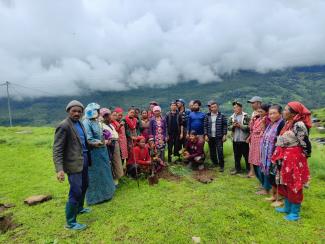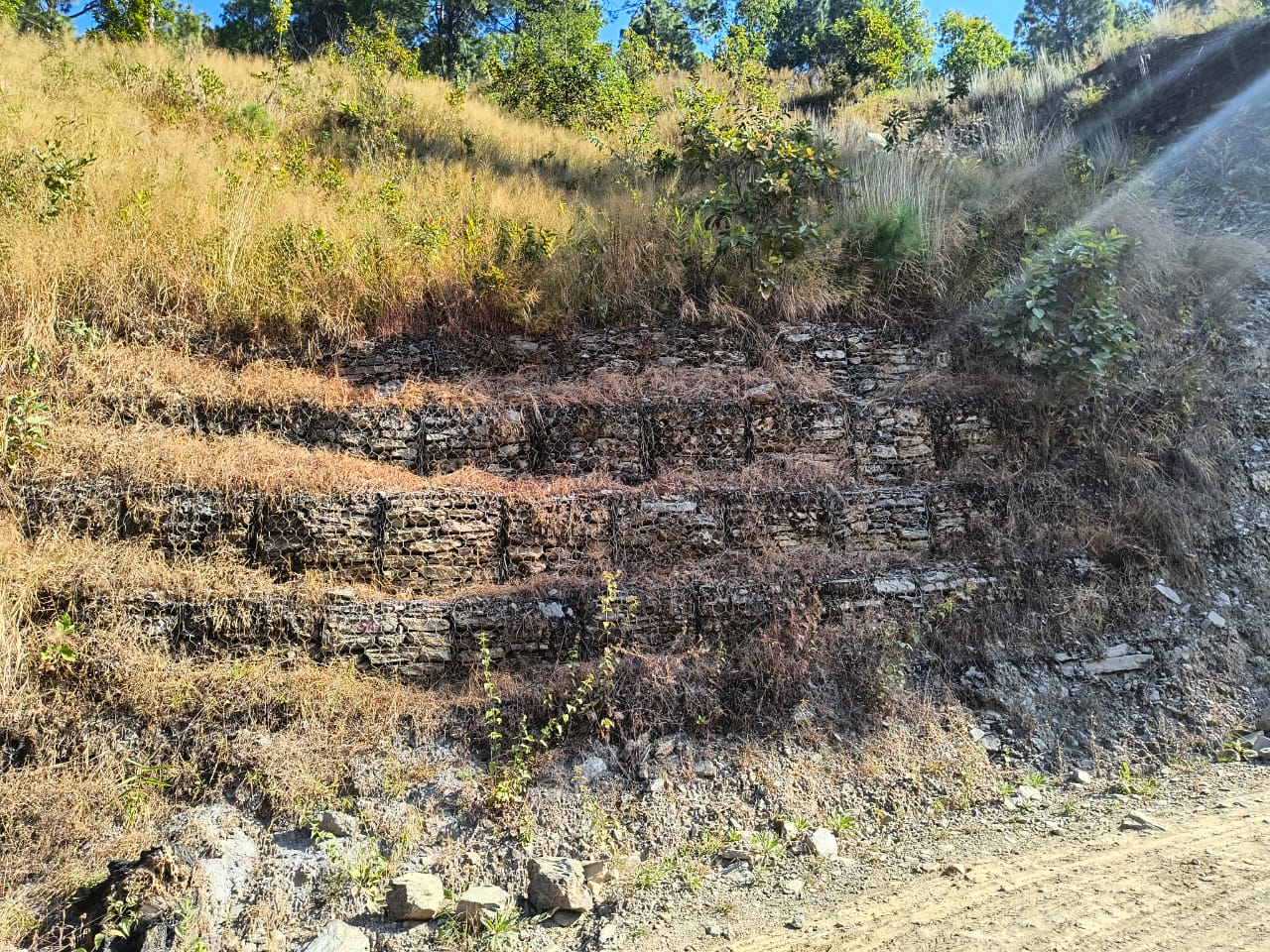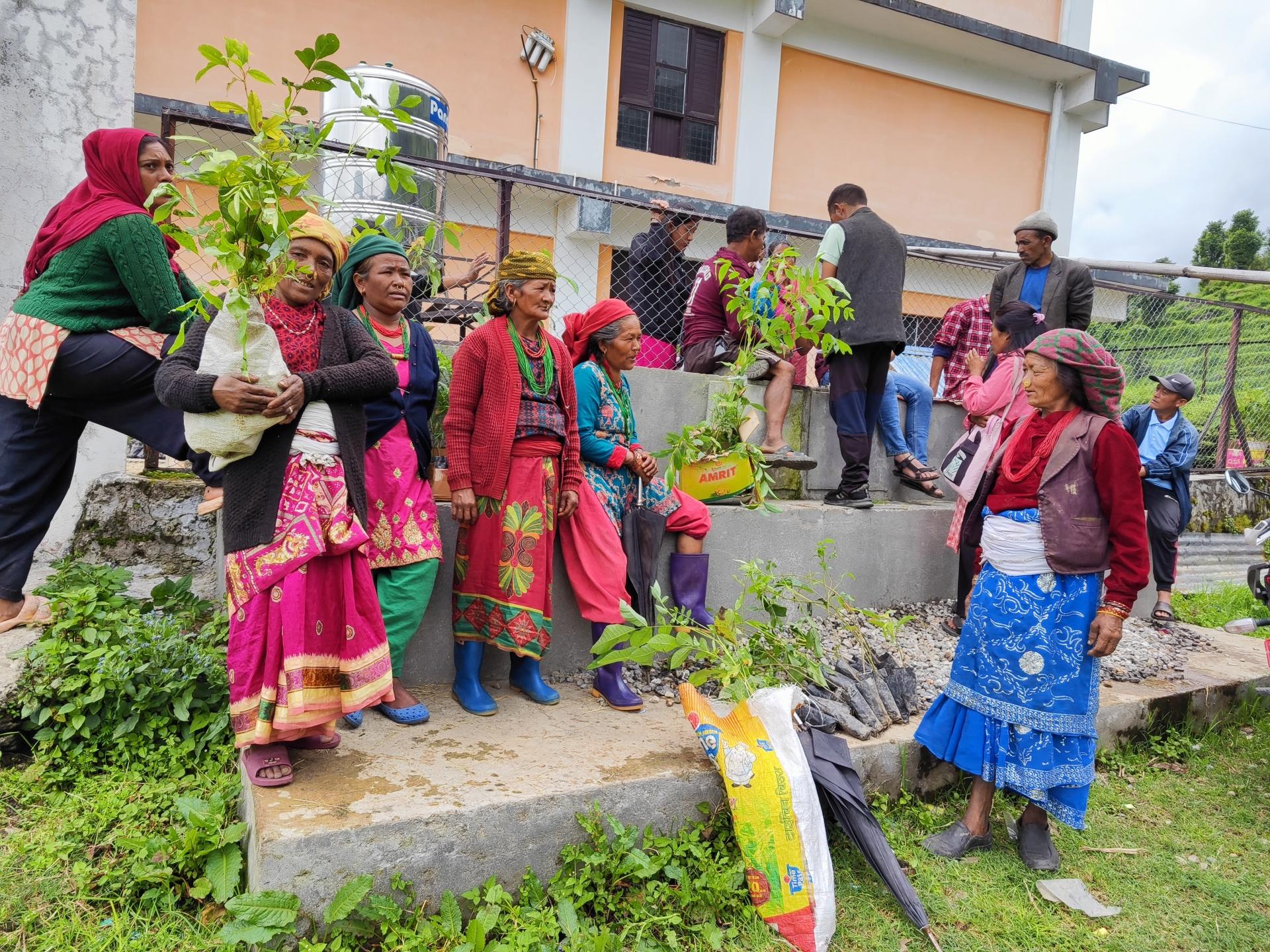
Settled in the shadow of the Himalayas at around 3,000 meters above sea level, the Thangmi community stands as a symbol of resilience and determination. For countless generations, these Indigenous communities have flourished amidst the rugged landscapes of Dolakha district, maintaining a profound connection with nature. Our traditions, livelihoods, and identities are interwoven with the land we call home. Our existence is also filled with challenges, particularly the persistent threat of landslides that emerges every monsoon season.
For the Thangmi Peoples, landslides are more than natural disasters: they are recurring nightmares that force us to constantly rebuild and adapt. Each year when the rains arrive, unstable slopes collapse under their weight, sweeping away homes, farmlands, and livestock. The destruction is not merely physical; it is a disruption to an entire way of life and places our cultural heritage at risk.
But this story is not one of despair. It is a story of hope, unity, and action. Recognizing that our survival depends on addressing these challenges head-on, the Thangmi have come together to tackle landslides through an innovative and transformative approach of bioengineering. This initiative combines Traditional Ecological Knowledge with modern techniques to stabilize slopes, prevent erosion, and protect our land for us and future generations.

Planting of grass species above a retaining structure.
A Community-Driven Solution: Bioengineering
The Thangmi community resides in the foothills of Dolakha, a district of striking natural beauty with terraced fields and dense forests that are highly vulnerable to landslides. The region’s fragile geology contributes significantly to the frequency and severity of landslides, especially during the monsoon rains. This poses a persistent threat to the lives and livelihoods of the local population. The impact of landslides is devastating: homes can be buried, crops destroyed, and roads blocked, cutting off access to markets, schools, and healthcare. Families lose their livelihoods, and in some cases, their loved ones. For the Thangmi Peoples, these disasters compound existing challenges of food insecurity, displacement, and loss of income, creating a cycle of vulnerability that is difficult to escape. And as climate change intensifies rainfall patterns, the threat of landslides grows even more severe.
To confront and potentially prevent the devastating effects of these landslides, Thangmi communities have turned to bioengineering—a method that integrates traditional practices with scientific techniques to stabilize the land and prevent erosion. This approach is rooted in the wisdom of our Elders, who have long understood the relationships among plants, soil, and water. The project began as a collective vision, as community members gathered to discuss the problem and identify solutions, drawing on our deep connection to the land. Together, we created a plan to reinforce vulnerable slopes using vegetation and terracing.
Bioengineering is a sustainable, nature-based approach that uses plants and natural materials to strengthen the soil and prevent landslides. It is particularly effective in fragile, erosion-prone areas, offering both environmental and social benefits. In our project, we have planted deep-rooted grasses and trees on unstable slopes. Key species include broom grass (Thysanolaena maxima), which binds the soil with its strong roots, and guava trees, which not only stabilize the land but also provide fruit that can be sold as a critical source of income.
We have also employed terracing techniques to reduce the steepness of slopes and minimize water runoff. Stone barriers and bamboo structures further support the soil, preventing erosion during heavy rains. These measures are complemented by community-led efforts to monitor and maintain the land. Elders guide the selection of species and planting techniques, ensuring that their Traditional Knowledge is honored and applied. Youth lead the physical labor, bringing energy and enthusiasm to the project. Together, they have been working, turning disaster prevention into an opportunity for sustainable development.

Beyond Disaster Prevention: Transforming Lives
With the aid of this project, the Thangmi communities have implemented two distinct programs aimed at raising awareness and building resilience in the community. The Community Awareness on Landslide Risks and Mitigation program focused on educating the community about the risks of landslides and practical measures to mitigate them. Interactive discussions were held emphasizing the calamitous effects of landslides, the importance of preparedness, and the use of locally available resources to reduce vulnerability. These sessions incorporated Traditional Knowledge and practices, ensuring that the community’s Indigenous wisdom was acknowledged and integrated into modern mitigation strategies.
Our presentations on climate change and bioengineering solutions were delivered to school kids between the ages of 12–16, covering topics such as the causes and effects of climate change, its role in exacerbating landslide risks, and the potential of bioengineering as an effective mitigation technique. Students learned about how climate change impacts local ecosystems, intensifies weather events, and contributes to soil instability. The presentations highlighted bioengineering, such as planting deep-rooted vegetation and constructing natural barriers using organic materials to stabilize slopes and prevent landslides.
This initiative is about more than just preventing landslides: it is about transforming lives and building a resilient future. The communities have utilized areas for farming, allowing families to grow crops and earn a living. The planting of fruit trees has created new sources of income, reducing our dependence on external aid. The project has also strengthened community bonds, as working together toward a common goal has fostered a sense of unity and pride. Children, too, are involved in the effort, learning about conservation and sustainable living. This collaboration ensures that the knowledge and practices developed together will be passed down to future generations.
The principles of resilience and community action are universal. Some of the practical lessons the Thangmi community have learned so far are:
1. Start with Community Unity: Solutions are most effective when they are driven by the community. Elders, youth, and all community members should be engaged in discussions to identify challenges and solutions. Collective action strengthens bonds and ensures that everyone feels invested in the outcome.
2. Leverage Traditional Knowledge: Indigenous knowledge is a powerful resource. When combined with modern techniques, it offers the possibility of solutions that are both innovative and grounded in a community’s unique context.
3. Focus on Sustainable Practices: Addressing natural disasters is not just about immediate relief; it is about long-term resilience. Practices should protect the environment while providing economic benefits to the community.
4. Involve the Next Generation: Children must be taught about the importance of conservation and sustainability. Their involvement ensures that the work started today will continue in the future.
5. Seek Partnerships: While community action is vital, external support can amplify your efforts. Collaborate with organizations, researchers, and government agencies to access resources, training, and funding.
The Thangmi community’s journey in landslide prevention and mitigation is one of transformation and hope. Despite the challenges we face, we have found strength in unity and a way forward through bioengineering. Our efforts not only protect their land but also preserve our culture and way of life. This project aims to raise awareness among all community members, irrespective of age, about landslide risks and mitigation strategies. Special emphasis is placed on empowering the younger generation, as they are the leaders of tomorrow. By equipping students with knowledge about locally available tools and techniques and fostering an understanding of bioengineering principles, the project seeks to instill a long-term commitment to sustainable practices and disaster resilience. Engaging with the Thangmi community in this manner enhances our capacity to mitigate landslide risks while also strengthening our connection to our Indigenous Knowledge and the environment. As a result, the community becomes better prepared to address future challenges, building a foundation for safer and more sustainable living conditions.
2024 Keepers of the Earth Fund grant partner, Bigu Thami Bhume Samaj (Thangmi Community Welfare Association), was founded in 2017 and is exclusively composed of individuals belonging to the Thangmi community, an Indigenous ethnic group native to Nepal with deep cultural roots in the Himalayan region.
Top photo: Thami community members during a practical planting training.
